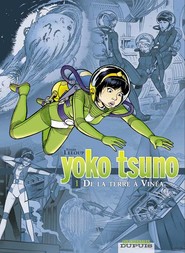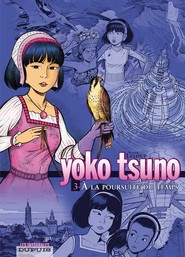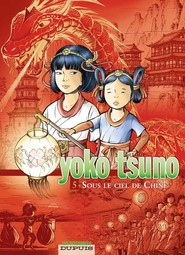Yoko Tsuno
Been meaning to post about this for a while–among the stuff that I read when younger were several bandes dessinées–many of which haven’t been translated, and I thought I’d do a post (and yup, this also explains the icon). Yoko Tsuno was one of the BDs I enjoyed most (the other being a tie between the very first volumes of heroic fantasy Aria, and Gaston Lagaffe). Furthermore, I was happy to see recently that they still held up quite well to reread years afterwards–and it’s not the case for all BDs, because they were primarily written for a child audience and some of the plots can clunk quite painfully when you’re an adult.



It’s a bit hard to describe the series. Like a lot of BDs, it’s actually written by a Belgian, Roger Leloup–and has been going on for a while, since 1970 and with more than 26 volumes published. It basically follows the adventures of the eponymous character Yoko Tsuno, a Japanese Electrical Engineer living in Brussels–and most of the modern-day series is set in Belgium. However, Yoko is soon embroiled in different categories of trouble: she meets the blue-skinned Vineans, aliens who have taken refuge on earth after their planet was destroyed (and later returns to help settle Vinea); she travels around in time from Indonesia to an alternate future in which Earth was destroyed; and she is generally embroiled in shennanigans ranging from scientific experiments in cryogeny to giant iguanas within the Hong Kong Bay.
She’s assisted in this by Pol and Vic, two boys who start out as her cameramen and later graduate to official sidekicks (and love interest). Other recurring characters include Rosée (“Morning Dew”), Yoko’s adopted daughter; Monya, a girl from the future who inherited a time machine; Khâny and Poky, the Vinean twins (albeit slightly time-dilated, since Khâny is an adult, and Poky a child about the same age as Rosée); and Ingrid, the German organist who has a gift for getting embroiled in Gothic intrigues.
There are lots of things I love about this series: the art is very often stunning, especially when drawing on real-life settings (one of my early favorites, The Edge of Life aka “Frontière de la Vie”, takes place in Rothenburg, a lovely German town that retains most of its medieval buildings). The charaters, considering it’s a BD in 47-page installment, are well-drawn (I especially like Vic, who desperately tries to appear competent and manly, but is frequently outclassed by Yoko). The BD touches on several themes from the morality of changing the past to the ethics of biomanipulation, but never preaches; and the latest episodes are still very strong–a pretty rare feat considering how long the series has been going on.
And of course, there’s Yoko herself, who’s the multi-competent badass (but it’s a nice change to see that she solves problems more through science than through action); who never hesitates to let her sense of what is right guide her; and who straddles several worlds from Asia to Europe [1]. Of course, all that never goes very far because it’s a BD and not a novel, and there’s not much room for character introspection, but still… still, no fan service, strong women characters, awesome worldbuilding, and strong plots. What’s not to like?
ETA: I’ve discovered that Cinebook, the same guys who translate Blake and Mortimer and Thorgal, have translated a couple of eps. You can read about them here, and they should be available on amazon, too! I’d recommend “The Time Spiral”, “The Dragon of Hong Kong”, and “On the Edge of Life”. “The Time Spiral” is pretty much one of my series favourite.
(and yes, Yoko and Rosée are my newest icon 🙂 )
[1] I have no idea how much of all that stuff is accurate. I haven’t seen anything horrendously wrong, but quite possibly the Japanese and Chinese characters are off (the French/Belgian stuff is pretty accurate, but that’s not surprising). Still, the series gets points for pretty much taking the ethnicity of its main character(s) for granted, and being generally so strong on actual ethnic and gender diversity (a lot of Franco-Belgian BDs can be awfully parochial, and considering the first few eps date back to the Seventies, the record is pretty impressive).
ETA: though, given that the BD was translated into Chinese by a Hong Kong publisher, the depiction of Chinese people can’t be that horrendous…
0 comments
Fred Warren
Alas for my monolingual American upbringing. Perhaps some enterprising fan will create an English translation one day. Babelfish makes its usual hash of the webpage, with such gaffes as, “Vic is very quickly relegated to the row of nice development, passionately in love with heroin.”
Herge’s Adventures of Tintin was a childhood favorite of mine, serialized in the now-defunct magazine, Children’s Digest. I can only pray Spielberg doesn’t succeed where Tintin’s many adversaries failed.
Brittain
I wonder if this was ever translated into Japanese. It sounds like something I should get my kids reading. (Except for maybe that “passionately in love with heroin bit.”)
aliette
Fred: lol, the translation sounds… very automated. I hope it sort of made sense… (they have an English page, but it’s not very understandable). I have since discovered, however, that Cinebook has translated a couple eps, and you can find them on amazon (we gave some Cinebook BDs to some friends, and the translations are OK, if not consistent from one volume to the next). http://www.cinebook.co.uk/index.php?cPath=189&osCsid=3be49e0c534e04d4f084d8ca4a5b7bb7
Brittain: I think they haven’t been translated into Japanese (I know two of them were translated into Chinese). I was given to understand (but I’m not sure in what measure it’s true) that non-Japanese authors writing about Japanese characters would never get translated into Japanese, as it was assumed they’d make a hash of it?
(and the love is pretty much totally platonic. Very few of those old BDs even graduate to kissing stage)
Brittain
Late response. Indeed, the Japanese pretty much figure that any non-Japanese is going to butcher the culture. I tend to agree and have seen little to change my mind. Still, since my kids see Japan simultaneously from the inside and outside, it might be something they’d like.
Also, the in love with heroin part depends on a translation error: heroine is a female hero, heroin is a horrible and addictive drug. 🙂
aliette
There’s actually little Japanese culture in the books per se (Yoko is a transplant, and her origins never play out very strongly except in some select eps). I think there is more alien and Franco-Belgian culture in the comics than actual Japanese bits… (you do have to put a blank over the first few eps if you don’t want to get hit over the head by nasty orientalism, though. The eps that were written in the Seventies rely a bit too much on mystical humble Asian handwaving.
Indeed, the Japanese pretty much figure that any non-Japanese is going to butcher the culture. I tend to agree and have seen little to change my mind.
I do agree with some of what you say (I’ve seen little Vietnamese or French culture gotten right in books); but the principle of it does bother me–not least because it also reflects the attitude of some Japanese towards foreigners. At the very least, Japanese in multi-ethnic casts should get some tolerance, or we’re going to be stuck with the same old boring White future in SF books..
Brittain
Oh, they’re gleefully xenophobic. I consider it my calling in life to drag Japan and the US, kicking and screaming to be sure, to a greater mutual understanding. I’ll probably fail, but it’s the thought that counts. If I could actually write fiction, I would give cultural understanding a shot. I can’t though, so I’ll just applaud you from the sidelines.
Sorry. Comments are closed on this entry.